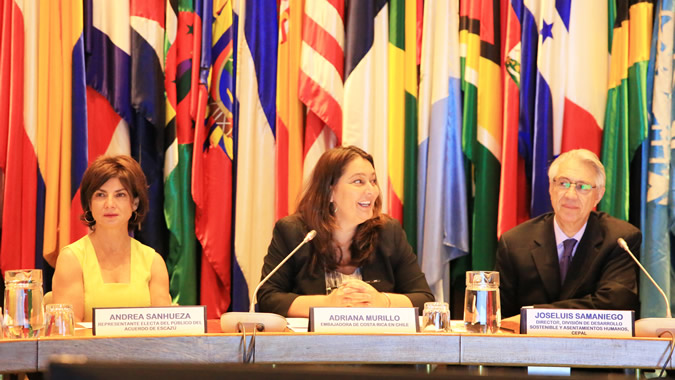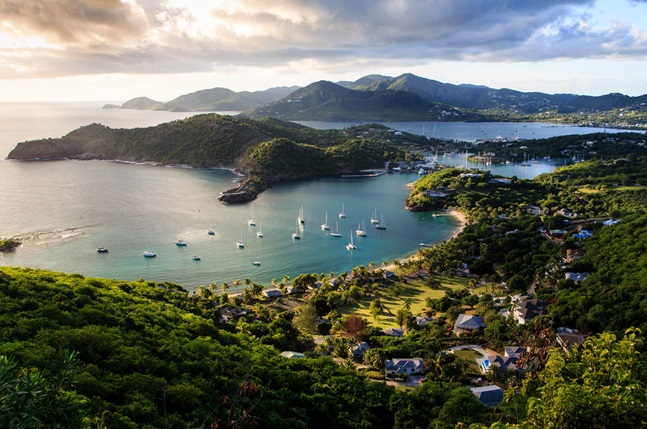The Escazú Agreement’s Adoption Two Years Ago is Celebrated as its Entry into Force Approaches
Work area(s)
Topic(s)
Latin America and the Caribbean’s first environmental treaty has already been signed by 22 countries in the region, and it is expected to enter into force soon.

Today, March 4th, marks two years since the adoption of the Regional Agreement on Access to Information, Public Participation and Justice in Environmental Matters in Latin America and the Caribbean, better known as the Escazú Agreement – the region’s first environmental treaty and the first in the world to contain specific provisions regarding human rights defenders in environmental matters.
On this very special day, Antigua and Barbuda deposited the instrument of ratification in a ceremony held at the United Nations Headquarters in New York. Of the 22 countries that have signed the Agreement to date, six have ratified it and three others have completed their internal processes to achieve this. Eleven (11) ratifications are needed for the accord to enter into force.
To commemorate this second anniversary, the Economic Commission for Latin America and the Caribbean (ECLAC), along with the government of Costa Rica and a non-governmental organization called The Access Initiative, organized an event at the Commission’s headquarters in Santiago, Chile, with the aim of reiterating the region’s commitment to this historic agreement and celebrating its relevance to more egalitarian, just and sustainable development.
In addition, at the event, five young people were named “Champions of Escazú,” meaning people committed to the Agreement who foster its dissemination and prompt entry into force. They are:
- Nicole Becker (Argentina)
- Sebastián Benfeld (Chile)
- Laura Serna (Colombia)
- Kyara Cascante (Costa Rica)
- Nafesha Richardson (Saint Vincent and the Grenadines)
Participants in the gathering included Andrea Sanhueza, a representative of the public chosen for the Escazú Agreement’s negotiation process; Adriana Murillo, the Ambassador of Costa Rica in Chile; and representatives of ECLAC, the institution that holds the Technical Secretariat of the Agreement; along with members of the diplomatic corps and representatives of various Latin American and Caribbean countries.
Alicia Bárcena, ECLAC’s Executive Secretary, sent a special message to the event in which she congratulated the countries that have signed the Agreement and invited more nations to do the same. “The Agreement has been signed by two-thirds of the region’s countries, which represent 560 million people, meaning more than 90% of our region’s population. In addition, with the latest ratifications, we are very close to having it enter into force, once 11 ratifications are reached,” she indicated in the text.
Bárcena also congratulated the five new Champions of Escazú announced this March 4th, who join the ranks of the first Champion: David Boyd, the United Nations Special Rapporteur on Human Rights and the Environment. “Today you take on the exciting task of being ambassadors for the Escazú Agreement in your countries and in the region. Thanks to your commitment, dedication and effort, I am sure that the Agreement will become even more widely known and recognized, and we will move in a more decisive way towards its prompt entry into force,” she told them.
Along with reiterating that the Agreement is a pioneering instrument to achieve the sustainable and lasting development that would contribute to implementation of the 2030 Agenda, Alicia Bárcena also called for reflecting on the dramatic situation that environmental defenders face in our region.
“At ECLAC we have indicated that it is not possible to preserve the environment without protecting those who defend it. And we must not forget that the Escazú Agreement conserves their mark, their yearning and hope for attaining a better future. This Agreement is also for them and, above all, it seeks to ensure that no one else is threatened, attacked or murdered for defending the environment in our region,” she stated.
Meanwhile, Andrea Sanhueza congratulated the new Champions of Escazú and mentioned that 58 applications were received for this role: 50 from Latin America and 8 from the Caribbean, 31 men and 27 women from 18 countries. “We are very hopeful that you will work vigorously to achieve the 11 ratifications that we need to begin its implementation,” she said.
During her presentation, Ambassador Adriana Murillo shared a video message from her country’s Minister of Foreign Affairs, Rodolfo Solano, which was screened during the event and in which he recognizes the work carried out by Costa Rica and ECLAC during the Agreement’s negotiation process. “This regional commitment highlights the interdependence between human rights and the environment, and it refers specifically to the protection of environmental human rights defenders and enshrines key principles, such as progressiveness and non-regression,” the Costa Rican Foreign Minister stated.
Meanwhile, in the remarks made by the ambassadors of Argentina, the Dominican Republic, Ecuador, Guatemala, Mexico, Nicaragua and Panama, they emphasized their countries’ commitment to this Agreement, which is by the region and for the region.
Also at the gathering, the new application for Android cell phones of the Observatory on Principle 10 in Latin America and the Caribbean was unveiled; it includes all the information, legislation and jurisprudence from countries related to the Escazú Agreement, in an easier and more accessible way. This new app is already available on the Observatory’s website.
Related link(s)
Country(ies)
- Latin America and the Caribbean
Contact
Public Information Unit
- prensa@cepal.org
- (56 2) 2210 2040
